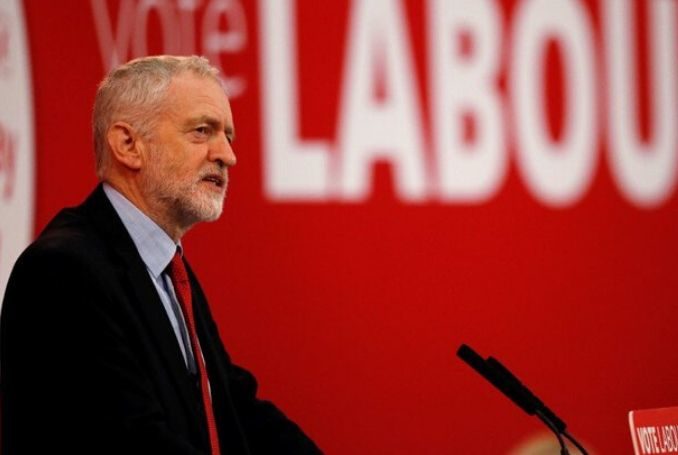
It is simply astonishing that the first attempt by the Guardian – the only major British newspaper styling itself as on the liberal-left – to properly examine the contents of a devastating internal Labour party report leaked in April is taking place nearly four months after the 860-page report first came to light.
If you are a Labour party member, the Guardian is the only “serious”, big-circulation paper claiming to represent your values and concerns.
One might, therefore, have assumed that anything that touches deeply on Labour party affairs – on issues of transparency and probity, on the subversion of the party’s democratic structures, on abuses or fraud by its officials – would be of endless interest to the paper. One might have assumed it would wish both to dedicate significant resources to investigating such matters for itself and to air all sides of the ensuing debate to weigh their respective merits.
My latest: Labour's explosive leaked report, showing how party officials plotted to destroy Corbyn, including by weaponising antisemitism, is being quietly swept under the carpet by the media and Labour's new leader Keir Starmer https://t.co/1m7WfRobhn
— Jonathan Cook (@Jonathan_K_Cook) April 16, 2020
Not a bit of it. For months, the leaked report and its implications have barely registered in the Guardian’s pages. When they have, the coverage has been superficial and largely one-sided – the side that is deeply hostile to its former leader, Jeremy Corbyn.
That very much fits a pattern of coverage of the Corbyn years by the paper, as I have tried to document. It echoes the paper’s treatment of an earlier scandal, back in early 2017, when an undercover Al-Jazeera reporter filmed pro-Israel Labour activists working with the Israeli embassy to damage Corbyn from within. A series of shocking reports by Al-Jazeera merited minimal coverage from the Guardian at the time they were aired and then immediately sank without trace, as though they were of no relevance to later developments – most especially, of course, the claims by these same groups of a supposed “antisemitism crisis” in Labour.
Sadly, the latest reports by the Guardian on the leaked report –presented as an “exclusive” – do not fundamentally change its long-running approach.
Kicked into the Long Grass
In fact, what the paper means by an “exclusive” is that it has seen documents responding to the leaked report that were submitted by Corbyn and his team to the Forde inquiry – Labour’s official investigation into that report and the circumstances of its leaking. The deadline for submissions to Martin Forde QC arrived last week.
Setting up the Forde inquiry was the method by which Corbyn’s successor, Keir Starmer, hoped to kick the leaked report into the long grass till next year. Doubtless, Starmer believes that by then the report will be stale news and that he will have had time to purge from the party, or at least intimidate into silence, the most outspoken remnants of Corbyn’s supporters.
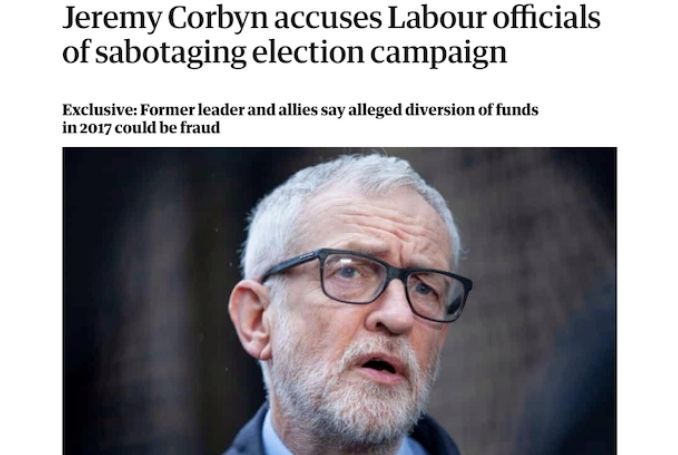
Corbyn’s submission on the leaked report is an “exclusive” for the Guardian only because no one in the corporate media bothered till now to cover the debates raging in Labour since the leak four months ago. The arguments made by Corbyn and his supporters, so prominent on social media, have been entirely absent from the so-called “mainstream”.
When Corbyn finally got a chance to air the issues raised by the leaked report in a series of articles on the Middle East Eye website, its coverage went viral, underscoring how much interest there is in this matter among Labour members.
Nonetheless, despite desperately needing clicks and revenue in this especially difficult time for the corporate media, the Guardian is still spurning revelatory accounts of Corbyn’s time in office by his former team.
One published last week – disclosing that, after winning the leadership election, Corbyn arrived to find the leader’s offices gutted, that Labour HQ staff refused to approve the hiring of even basic staff for him, and that disinformation was constantly leaked to the media – was relegated to the OpenDemocracy website.
Corbyn's team arrived to find the leadership's offices gutted, Labour HQ refused to approve the hiring of even basic staff, and disinformation was constantly leaked to the media.
An insider recounts how the Blairites waged war on Corbyn from day one https://t.co/KCROnquXto
— Jonathan Cook (@Jonathan_K_Cook) August 7, 2020
That Joe Ryle, a Corbyn team insider, either could not find a home for his insights in the Guardian or didn’t even try says it all – because much of the disinformation he laments being peddled to the media ended up in the Guardian, which was only too happy to amplify it as long as it was harming Corbyn.
A Political Coup
Meanwhile, everything in the Guardian’s latest “exclusive” confirms what has long been in the public realm, via the leaked report.
Through its extensive documentation of WhatsApp messages and emails, the report shows conclusively that senior Labour officials who had dominated the party machine since the Tony Blair and Gordon Brown eras – and were still loyal to the party’s center-right incarnation as New Labour – worked at every turn to oust Corbyn from the leadership. They even tried to invent ways to bar him from standing in a rerun leadership election a year later, in 2016, after Owen Smith, the Labour right’s preferred candidate, challenged him.
Corbyn and his supporters were viewed as dangerous “Trots” – to use a derisive term that dominates those exchanges.
The messages show these same officials did their level best to sabotage Labour’s 2017 general election campaign – an election that Corbyn was less than 3,000 votes from winning. Party officials starved marginal seats Corbyn hoped to win of money and instead focused resources on MPs hostile to Corbyn. It seems they preferred a Tory win if it gave momentum to their efforts to rid the party of Corbyn.
Or, as the submission notes: “It’s not impossible that Jeremy Corbyn might now be in his third year as a Labour prime minister were it not for the unauthorized, unilateral action taken by a handful of senior party officials.”
The exchanges in the report also show that these officials on the party’s right privately gave voice to horrifying racism towards other party members, especially black members of the party loyal to Corbyn.
And the leaked report confirms the long-running claims of Corbyn and his team that the impression of “institutional antisemitism” in Labour – a narrative promoted in the corporate media without any actual evidence beyond the anecdotal – had been stoked by the party’s rightwing, Blairite officials.
They appear to have delayed and obstructed the handling of the small number of antisemitism complaints – usually found by trawling through old social media posts – to embarrass Corbyn and make the “antisemitism crisis” narrative appear more credible.
Corbyn’s team have pointed out that these officials – whose salaries were paid by the membership, which elected Corbyn as party leader – cheated those members of their dues and their rights, as well as, of course, subverting the entire democratic process. The submission rightly asks the inquiry to consider whether the money spent by Labour officials to undermine Corbyn “constituted fraudulent activity”.
One might go even further and argue that what they did amounted to a political coup.
Bogus ‘Whistleblower’ Narrative
Even now, as the Guardian reports on Corbyn’s submission to the Forde inquiry, it has downplayed the evidence underpinning his case, especially on the antisemitism issue – which the Guardian played such a key role in weaponizing in the first place.
The paper’s latest coverage treats the Corbyn “claims” skeptically, as though the leaked report exists in a political vacuum and there are no other yardsticks by which the truth of its evidence or the plausibility of its claims can be measured.
Let’s start with one illustrative matter. The Guardian, as with the rest of the corporate media, even now avoids drawing the most obvious conclusion from the leaked report.
Racism was endemic in the language and behaviors of Labour’s senior, rightwing officials, as shown time and again in the WhatsApp messages and emails.
And yet it is these very same officials – those who oversaw the complaints procedure as well as the organization of party headquarters – who, according to the corporate media narrative, were so troubled by one specific kind of racism, antisemitism, that they turned it into the biggest, most enduring crisis facing Corbyn during his five-year tenure as leader.
To accept the corporate media narrative on this supposed “antisemitism crisis”, we must ignore several things:
* The lack of any statistical evidence of a specific antisemitism problem in Labour;
* the vehement racism expressed by Labour officials, as well as their overt and abiding hostility to Corbyn;
* moves by party officials forcing Corbyn to accept a new definition of antisemitism that shifted the focus from a hatred of Jews to criticism of Israel;
* and the fact that the handling of antisemitism complaints dramatically improved once these rightwing officials were removed from their positions.
And yet in its latest reporting, as with its earlier coverage, the Guardian simply ignores all this confirmatory evidence.
There are several reasons for this, as I have documented before, but one very obvious one is this: the Guardian, like the rest of the British media, had worked hard to present former officials on the right of the party as brave “whistleblowers” long before they were exposed by the leaked report.
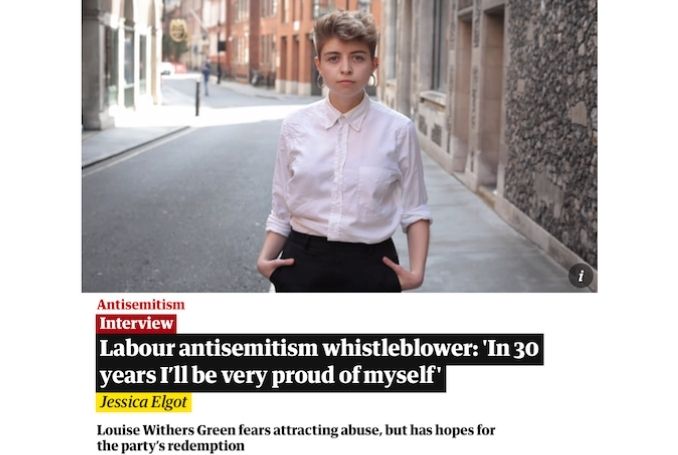
Like the BBC’s much-criticized Panorama “investigation” last year into Labour’s alleged “antisemitism crisis”, the Guardian took the claims of these former staff – of their supposed selfless sacrifice to save the party from anti-Jewish bigots – at face value.
My latest: With last night's Panorama programme on supposed 'institutional anti-semitism' in Labour, the BBC demonstrated that it has become a media attack dog in the hands of the ruling Conservative party https://t.co/dSDaaLBY0S
— Jonathan Cook (@Jonathan_K_Cook) July 11, 2019
In fact, it was likely even worse than that. The Guardian and BBC weren’t just passive, neutral recipients of the disinformation offered by these supposed “whistleblowers”. They shared the Labour right’s deep antipathy to Corbyn and everything he stood for, and as a result almost certainly served as willing, even enthusiastic channels for that disinformation.
The Guardian hardly bothers to conceal where its sympathies lie. It continues to laud Blair from beyond the political grave and, while Corbyn was leader, gave him slots in its pages to regularly lambast Corbyn and scaremonger about Labour’s “takeover” by the supposedly “extreme” and “hard” left. The paper did so despite the fact that Blair had grown ever more discredited as evidence amassed that his actions in invading Iraq in 2003 were crimes against humanity.
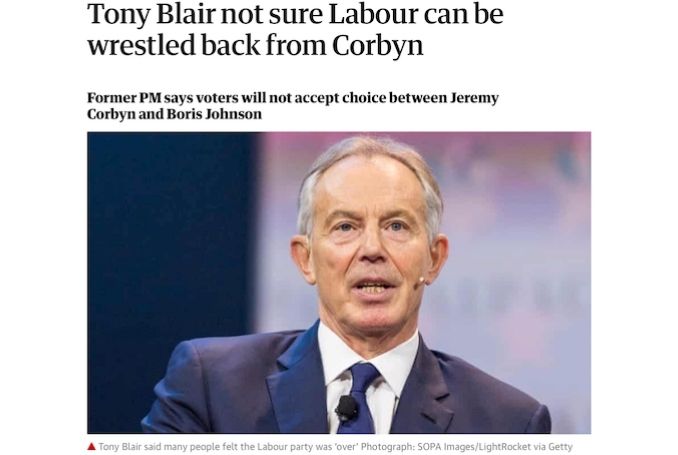
Were the Guardian to now question the narrative it promoted about Corbyn – a narrative demolished by the leaked report – the paper would have to admit several uncomfortable things:
* that for years it was either gulled by, or cooperated with, the Blairites’ campaign of disinformation;
* that it took no serious steps to investigate the Labour right’s claims or to find out for itself what was really going on in Labour HQ;
* that it avoided cultivating a relationship with Corbyn’s team while he was in office that would have helped it to ascertain more effectively what was happening inside the party;
* or that, if it did cultivate such a relationship (and, after all, Seumas Milne took up his post as Corbyn’s chief adviser immediately after leaving the Guardian), it consistently and intentionally excluded the Corbyn team’s account of events in its reporting.
To now question the narrative it invested so much energy in crafting would risk Guardian readers drawing the most plausible conclusion for their paper’s consistent reporting failures: that the Guardian was profoundly opposed to Corbyn becoming prime minister and allowed itself, along with the rest of the corporate media, to be used as a channel for the Labour right’s disinformation.
Stabbed in the Back
None of that has changed in the latest coverage of Corbyn’s submission to Forde concerning the leaked report.
The Guardian could not realistically ignore that submission by the party’s former leader and his team. But the paper could – and does – strip out the context on which the submission was based so as not to undermine or discredit its previous reporting against Corbyn.
Its main article on the Corbyn team’s submission becomes a claim and counter-claim story, with an emphasis on an unnamed former official arguing that criticism of him and other former staff at Labour HQ is nothing more than a “mythical ‘stab in the back’ conspiracy theory”.
The problem is that there are acres of evidence in the leaked report that these officials did stab Corbyn and his team in the back – and, helpfully for the rest of us, recorded some of their subversive, anti-democratic activities in private internal correspondence between themselves. Anyone examining those message chains would find it hard not to conclude that these officials were actively plotting against Corbyn.
To discredit the Corbyn team’s submission, the Labour right would need to show that these messages were invented. They don’t try to do that because those messages are very obviously only too real.
Instead, they have tried two different, inconsistent strategies. First, they have argued that their messages were presented in a way that was misleading or misrepresented what they said. This claim does not hold water, given that the leaked report includes very lengthy, back-and-forth exchanges between senior staff. The context of those exchanges is included – context the officials themselves provided in their messages to each other.
Second, the self-styled “whistleblowers” now claim that publication of their messages – documenting efforts to undermine Corbyn – violates their right to privacy and breaches data protection laws. They can apparently see no public interest in publishing information that exposes their attempts to subvert the party’s internal democratic processes.
It seems that these “whistleblowers” are more committed to data concealment than exposure – despite the title they have bestowed on themselves. This is a strange breed of whistleblower indeed, one that seeks to prevent transparency and accountability.
In a telling move, despite claiming that their messages have been misrepresented, these former officials want the Forde inquiry to be shut down rather than given the chance to investigate their claims and, assuming they are right, exonerate them.
Further, they are trying to intimidate the party into abandoning the investigation by threatening to bankrupt it through legal actions for breaching their privacy. The last thing they appear to want is openness and a proper accounting of the Corbyn era.
Shrugging Its Shoulders
In its latest reporting, the Guardian frames the leaked report as “clearly intended to present a pro-Corbyn narrative for posterity” – as though the antisemitism narrative the Guardian and the rest of the corporate media spent nearly five years crafting and promoting was not clearly intended to do the precise opposite: to present an anti-Corbyn narrative for posterity.
Peter Walker, the paper’s political correspondent, describes the messages of former, rightwing Labour officials as “straying” into “apparent” racism and misogyny, as though the relentless efforts revealed in these exchanges to damage and undermine prominent black MPs like Diane Abbott are open to a different interpretation.
Officials at the very top of @UKLabour said stuff like “Abbott is truly repulsive” “Abbott literally makes me sick” and conspired with media against me. Now claiming remarks taken out of context. So let’s have full publication of all communications #LabourLeaks
— Diane Abbott MP (@HackneyAbbott) August 7, 2020
According to Walker, the report’s evidence of election-scuppering in 2017 is “circumstantial” and “there is seemingly no proof of active obstruction”. Even assuming that were true, such a deficiency could easily be remedied had the Guardian, with all its staff and resources, made even the most cursory effort to investigate the leaked report’s claims since April – or in the years before, when the Corbyn team were trying to counter the disinformation spread by the Labour right.
The Guardian largely shrugs its shoulders, repeatedly insinuating that all this constitutes little more than Labour playground bickering. Starmer is presented as school principal – the one responsible adult in the party – who, we are told, is “no stranger to managing Labour factions”.
The Guardian ignores the enormous stakes in play both for Labour members who expected to be able to shape the party’s future using its supposedly democratic processes and for the very functioning of British democracy itself. Because if the leaked report is right, the British political system looks deeply rigged: there to ensure that only the establishment-loving right and center-right ever get to hold power.
The Guardian’s approach suggests that the paper has abdicated all responsibility for either doing real journalism on its Westminster doorstep or for acting as a watchdog on the British political system.
Guardian Hypocrisy
Typifying the hypocrisy of the Guardian and its continuing efforts to present itself a hapless bystander rather than active participant in efforts to disrupt the Labour party’s internal democratic processes and sabotage the 2017 and 2019 elections is its lead columnist Jonathan Freedland.
Outside of the Guardian’s editorials, Freedland’s columns represent the closest we have to a window on the ideological soul of the paper. He is a barometer of the political mood there.
Freedland was among the loudest and most hostile opponents of Corbyn throughout his time as leader. Freedland was also one of the chief purveyors and justifiers of the fabled antisemitism narrative against Corbyn.
He, and the rightwing Jewish Chronicle he also writes for, gave these claims an official Jewish seal of approval. They trumpeted the narrow, self-serving perspective of Jewish organizations like the Board of Deputies, whose leaders are nowadays closely allied with the Conservative party.
They amplified the bogus claims of the Jewish Labour Movement, a tiny, pro-Israel organization inside Labour that was exposed – though the Guardian, of course, never mentions it – as effectively an entryist group, and one working closely with the Israeli embassy, in that detailed undercover investigation filmed by Al-Jazeera.
Freedland and the Chronicle endlessly derided Jewish groups that supported Corbyn, such as Jewish Voice for Labour, Just Jews and Jewdas, with antisemitic insinuations that they were the “wrong kind of Jews”. Freedland argued that strenuous criticism of Israel was antisemitic by definition because Israel lay at the heart of any proper Jew’s identity.
New video from #JustJews: Jews have never spoken with just one voice. #BoardofDeputies #ManyJewishVoices pic.twitter.com/KSpyy8Sqcw
— Just Jews (@JustJewsUK) August 6, 2020
It did not, therefore, matter whether critics could show that Israel was constitutionally racist – a state similar to apartheid South Africa – as many scholars have done. Freedland argued that Jews and Israel were all but indistinguishable, and to call Israel racist was to malign Jews who identified with it. (Apparently unaware of the Pandora’s box such a conflation opened up, he rightly – if inconsistently – claimed that it was antisemitic for anyone to make the same argument in reverse: blaming Jews for Israel’s actions.)
Freedland pushed hard for Labour to be forced to adopt that new, troubling definition of antisemitism, produced by the International Holocaust Remembrance Alliance, that shifted the focus away from hatred of Jews to criticism of Israel. Under this new definition, claims that Israel was “a racist endeavor” – a view shared by some prominent Israeli scholars – was treated as definitive proof of antisemitism.
One-party Politics
If anyone gave the weaponization of antisemitism against Corbyn an air of bipartisan respectability it was Freedland and his newspaper, the Guardian. They made sure Corbyn was hounded by the antisemitism claims while he was Labour leader, overshadowing everything else he did. That confected narrative neutralized his lifelong activism as an anti-racist, it polluted his claims to be a principled politician fighting for the underdog.
Freedland and the Guardian not only helped to breathe life into the antisemitism allegations but they made them sound credible to large sections of the Labour membership too.
The rightwing media presented the Corbyn project as a traitorous, hard-left move, in cahoots with Putin’s Russia, to undermine Britain. Meanwhile, Freedland and the Guardian destroyed Corbyn from his liberal-left flank by portraying him and his supporters as a mob of leftwing Nazis-in-waiting.
Corbynism, in Freedland’s telling, became a “sect”, a cult of dangerous leftists divorced from political realities. And then, with astonishing chutzpah, Freedland blamed Corbyn’s failure at the ballot box – a failure Freedland and the Guardian had helped to engineer – as a betrayal of the poor and the vulnerable.
This isn’t just a defeat, it’s a repudiation of Corbynism. Now Labour needs to ditch the politics of the sect. My column https://t.co/cV3LlRMyED
— Jonathan Freedland (@Freedland) December 13, 2019
Remember, Corbyn lost by less than 3,000 votes in a handful of Labour marginals in 2017. Despite all this, Freedland and the Guardian now pretend that they played no role in destroying Corbyn, they behave as if their hands are clean.
But Freedland’s actions, like those of his newspaper, had one inevitable outcome. They ushered in the only alternative to Corbyn: a government of the hard-right led by Boris Johnson.
Freedland’s choice to assist Johnson by undermining Corbyn – and, worse, to do so on the basis of a disinformation campaign – makes him culpable, as it does the Guardian, in everything that flowed from his decision. But Freedland, like the Guardian, still pontificates on the horrors of the Johnson government, as if they share no blame for helping Johnson win power.
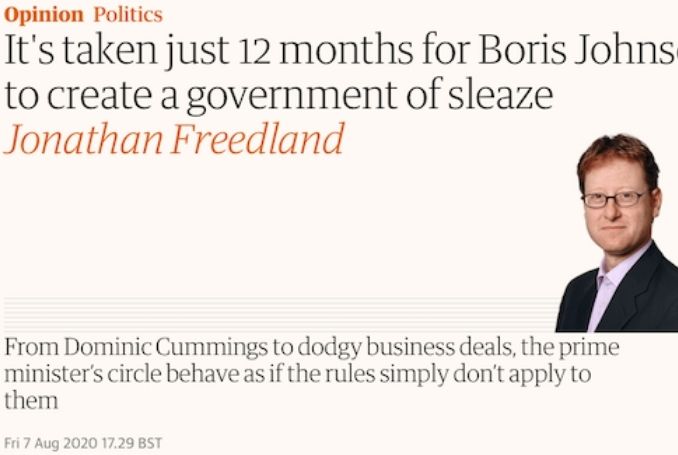
In his latest column, Freedland writes: “The guiding principle [of the Johnson government] seems to be brazen cronyism, coupled with the arrogance of those who believe they are untouchable and that rules are for little people.”
Why should the Tories under Johnson be so “arrogant”, so sure they are “untouchable”, that “rules are for little people”, and that there is no political price to be paid for “cronyism”?
Might it not have much to do with seeing Freedland and the Guardian assist so willingly in the corporate media’s efforts to destroy the only political alternative to “rule by the rich” Toryism? Might the Johnson government have grown more confident knowing that the ostensibly liberal-left media were just as determined as the rightwing media to undermine the only politician on offer who stood for precisely the opposite political values the Tories did?
Might it not reflect an understanding by Johnson and his chief adviser, Dominic Cummings, that Freedland and the Guardian have played a hugely significant part in ensuring that Britain effectively has a one-party state – and that when it returns to being a formal two-party state, as it seems to be doing once again now that Starmer is running the Labour party, both those parties will offer the same establishment-worshipping agenda, even if in two mildly different flavors?
The Guardian, like the rest of the corporate media, has derided and vilified as “populism” the emergence of any real political alternative.
The leaked report offered a brief peek behind the curtain at how politics in Britain – and elsewhere – really works. It showed that, during Corbyn’s time as leader, the political battle lines became intensely real. They were no longer the charade of a phony fight between left and right, between Labour and Conservative.
Instead, the battle shifted to where it mattered, to where it might finally make change possible: for control of the Labour party so that it might really represent the poor and vulnerable against rule by the rich. Labour became the battleground, and the Guardian made all too clear where its true loyalties lie.
– Jonathan Cook won the Martha Gellhorn Special Prize for Journalism. His books include “Israel and the Clash of Civilisations: Iraq, Iran and the Plan to Remake the Middle East” (Pluto Press) and “Disappearing Palestine: Israel’s Experiments in Human Despair” (Zed Books). Visit his website www.jonathan-cook.net. He contributed it to The Palestine Chronicle.

– Jonathan Cook won the Martha Gellhorn Special Prize for Journalism. His books include “Israel and the Clash of Civilisations: Iraq, Iran and the Plan to Remake the Middle East” (Pluto Press) and “Disappearing Palestine: Israel’s Experiments in Human Despair” (Zed Books). Visit his website www.jonathan-cook.net. He contributed this article to The Palestine Chronicle.







